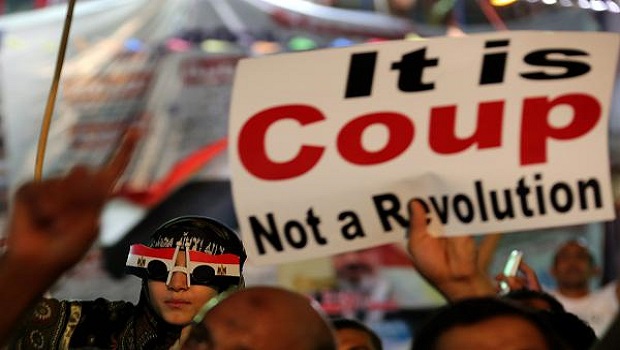Recep Tayyip Erdoğan has not lost out after the coup which ousted his friend Mohamed Mursi, because at the end of the day, he is an elected leader who stands on firm ground. In the past ten years, he and his party elevated Turkey to become one of the world’s strongest 20 economies, the G20.
The Turkish economy still continues to perform miracles in an area which suffers from political and economic strife, as is the case in Greece and Cyprus, as well as the depression in Europe generally. It is also in a region full of political turmoil, as is the case in Syria, Iraq and Iran.
The military coup in Egypt toppled a legitimate government, and led to the ouster of the first elected president in Egypt’s history, a president who managed within a few months to strengthen long-established, historic relations between Egypt and Turkey.
When Erdoğan announced his support for the now-ousted President Mohamed Mursi, signs of an important regional axis began to appear, an axis which could share almost identical positions on regional and international issues.
The ouster of Mursi did not only destroy Egypt’s first attempt at democracy, it also led to a deep shock for Erdoğan and Turkey, who were reminded of Turkey’s own history of military coups and the military interference in politics, which Turkey has yet to fully recover from.
Since the coup of May 1960, which led to the execution of Prime Minister Adnan Menderes and the imprisonment for life of president of the republic, Celal Bayar, a failed coup by Colonel Talat Aydemir took place in 1963, followed by General Kenan Evren’s coup in 1980. Evren suspended party activities and then disbanded them. He introduced a new constitution in 1982.
The constitution included an explicit provision in article 13, which stated that socialist, fascist and religious parties were banned. Thus he outlawed parties which opposed the People’s Party and Ataturk-style secularism.
Article 96 of the parties’ law banned the use of terms such as communism, anarchism, socialism, fascism, nationalism, religion, ethnicity, language, caste, and creed, or any words which give similar meaning, so they can use that to disband opposition parties.
In December 1995, the Welfare Party, led by Necmettin Erbakan, and its ally, the True Path (Doğru Yol), formed a government. He became the first Islamic prime minister, a fact which angered the secularists and made them push the military to move against the elected government.
In 1998, the Welfare Party was banned, and Erbakan was prosecuted for violating the secular state charters. He was banned from political activity for five years. Democratic life became a minefield afterwards, and vague laws were used as an excuse to disband parties.
The 2003 elections then brought in the Justice and Development Party, the party founded by Recep Tayyip Erdoğan–mayor of Greater Istanbul during the Welfare Party government, Abdullah Gul, and a number of Islamists who separated from the Felicity Party (Saadet Partisi) which was an offshoot of the Virtue Party.
Other coup attempts took place after that to topple Erdoğan or disband his party using the Supreme Constitutional Court, but they all failed.
This long history made the Turkish government very sensitive to military coups, and rejected them. That gives it a historic and moral stance, a desire to stop the military from interfering in political life.
A stance based on evidence that the coups which took place against legitimacy in the world since the Franco coup in Spain in 1936, ended in one of the following four scenarios:
1- The establishment of a military dictatorship, which the international situation cannot bear in Egypt at this time.
2- The establishment of a military dictatorship under civilian cover, which is what the current coup is moving towards.
3- Ending up in a situation of chaos and political turmoil.
4- Embroiling society in civil war.
All these possibilities are alarming and undesirable, because they may add another country in the region to the list of failed states.
Turkey is expected to play an effective international role which would prevent the recognition of the military coup in Egypt, a coup which carries out massacres against peaceful protesters who are defending legitimacy.
Turkey, in addition to the African Union and other states which have realized the dangers of a military coup to the stability of Egypt, will put pressure on the coup perpetrators to quickly return to the democratic path and release political detainees, including Mohamed Mursi. They will also push for an end to extraordinary measures of oppression, campaigns of incitement, and the sponsorship of hatred in the media against the supporters of constitutional legitimacy and democracy.
The counterpoint to this piece can be read here.

it is a true message